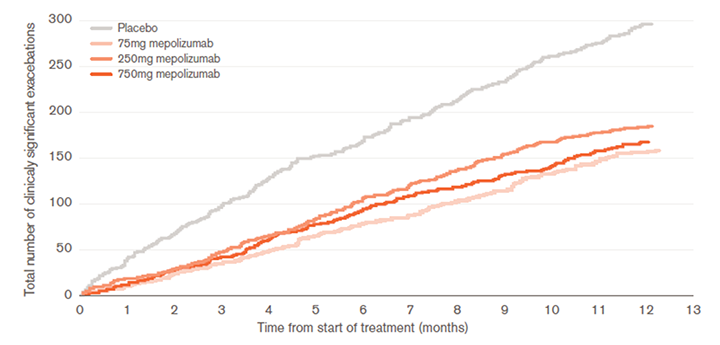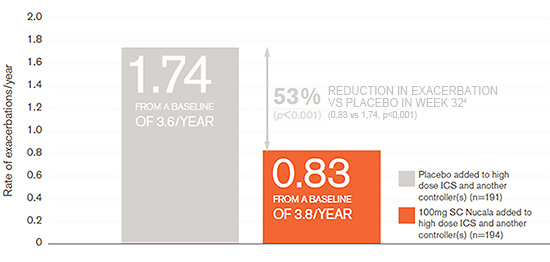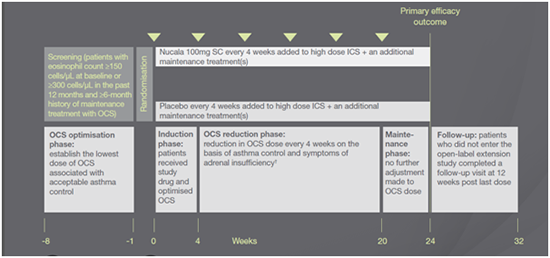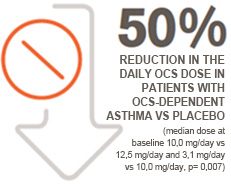Nucala Phase II and III clinical study summaries
Nucala has been investigated in three key clinical trials in severe refractory eosinophilic asthma: DREAM, MENSA and SIRIUS. Find out more about the design and results of these studies.
DREAM 3 – A dose-ranging study to evaluate the efficacy and safety of mepolizumab
The DREAM (Dose Ranging Efficacy And safety with Mepolizumab) study was a randomised, multicentre, double-blind, placebo-controlled, phase IIb clinical trial that investigated the efficacy and safety of mepolizumab in patients with severe refractory eosinophilic asthma. 1
Study design
The study included 616 patients, aged 12–74 years, with a history of severe asthma exacerbations (two or more, requiring systemic corticosteroid treatment in the previous 12 months) and evidence of eosinophilic inflammation as shown by one or more of the following criteria: 1
- sputum eosinophil count of 3% or more
- exhaled nitric oxide concentration of 50 ppb or more
- asthma-related peripheral blood eosinophil count of ≥300 cells/μL (≥0.3 x 109 cells/L)
- prompt deterioration of asthma control after a ≤25% reduction in regular maintenance inhaled or oral corticosteroids
Patients were randomised in a 1:1:1:1 ratio to receive one of three doses of intravenous (IV) mepolizumab (75mg, 250mg or 750mg)* or placebo,† every 4 weeks 1
*unlicensed doses/route of administration
†when both were added to high dose ICS and an additional maintenance treatment(s)
Key efficacy findings
Treatment with mepolizumab provided:
- Significant reductions in the rate of clinically significant exacerbations (primary endpoint) (defined as episodes of acute asthma requiring treatment with oral corticosteroids [OCS], admission/visit to an emergency department [ED]) vs. placebo (Nucala 75mg: 1.24 vs. placebo: 2.4, 48% reduction, p<0.0001; Nucala 250mg: 1.46 vs. placebo: 2.4, 39% reduction, p=0.0005; Nucala 750mg: 1.15 vs. placebo: 2.4, 52% reduction, p<0.0001) 1
- Reductions in the rate of exacerbations requiring hospitalisation or ED admissions/visits vs. placebo (secondary endpoint) (Nucala 75mg: 0.17 vs. placebo: 0.43, 60% reduction, p<0.05; Nucala 250mg: 0.25 vs. placebo: 0.43, 42% reduction,ns; Nucala 750mg: 0.22 vs. placebo: 0.43, 48% reduction ns) 1
Cumulative number of exacerbations over 52 weeks 1

Adapted from Pavord et al. 2012.
Nucala is indicated as an add-on treatment for adult patients with severe refractory eosinophilic asthma. 2
Nucala is only licensed for subcutaneous use (SC) and only at a dose of 100mg. 2
Key safety findings
- Incidence of serious adverse events (AEs) was similar across treatment groups 1
- The most frequently reported AEs were headache and nasopharyngitis 1
- The most frequent drug-related AE was injection site reaction 1
Summary
- All doses of mepolizumab significantly reduced clinically significant exacerbations vs. placebo (p<0.05) and were well tolerated, when both were added to high dose ICS and an additional maintenance treatment(s)
MENSA3 - Investigating the safety and efficacy of Nucala add-on therapy in patients with severe refractory eosinophilic asthma
The MENSA (Mepolizumab as Adjunctive Therapy in Patients with Severe Asthma) study was a randomised, multicentre, double-blind, double-dummy, placebo-controlled, phase IIIa clinical trial that investigated the safety and efficacy of mepolizumab in patients with severe refractory eosinophilic asthma. 3
Study design
The study included 576 patients,aged 12–82 years* entry criteria, which were informed from the DREAM study outcomes, included: 3
- Dependency on high dose ICS and an additional maintenance treatment(s) for at least 3 months, with or without OCS
- ≥2 asthma exacerbations in the prior 12 months
- Blood eosinophil levels of ≥150 cells/μL (≥0.15 x 109 cells/L) at initiation of treatment or ≥300 cells/μL (≥0.3 x 109 cells/L) in the prior 12 months
Patients were randomised to receive Nucala 100mg subcutaneous (SC), mepolizumab 75mg IV† or placebo in a 1:1:1 ratio added on to high dose ICS and an additional maintenance treatment(s). 3Only the data from the Nucala 100mg SC vs. placebo comparison are reported here.
*Nucala is indicated for SC use in adult patients with severe refractory eosinophilic asthma only.
†Unlicensed dose/route of administration
Adapted from Ortega et al. N Engl J Med 2014. 3
*Patients who received mepolizumab 75mg IV also received placebo SC, patients who received Nucala 100mg SC also received placebo IV and patients in the placebo arm received placebo both IV and SC.
Key efficacy findings
Reduction in exacerbation frequency vs. placebo at Week 32 (primary endpoint)

Nucala added to high dose ICS and an additional maintenance treatment(s) provided the following benefits compared with placebo added on to high dose ICS and an additional maintenance treatment(s):
- Significant reduction in clinically significant exacerbations* by 53% (primary endpoint, p<0.001) 3
- Significant reduction in exacerbations resulting in hospitalisations and/or ED visits by 61% (secondary endpoint, Nucala: 0.08/year, placebo: 0.2/year; p=0.015)† 2
- Significant reduction in exacerbations resulting in hospitalisations by 69% (secondary endpoint: Nucala: 0.03/year, placebo: 0.10/year; p=0.03) † 2
- Clinically meaningful improvement in health-related quality of life (SGRQ total score) by 7.0 units (secondary endpoint, p<0.001). 3
- Improvement in lung function (as measured by pre-bronchodilator FEV1) by 98mL (secondary endpoint, p=0.028). 2
*Defined as worsening of asthma that required use of systemic corticosteroids or hospitalisation and/or emergency department visit 1
†Statistical significance for these secondary endpoints cannot be inferred due to the hierarchical ‘gatekeeping’ approach used. The p-values provided are unadjusted for multiple comparisons.
Key safety findings
In placebo-controlled clinical trials with Nucala (added to high dose ICS and additional maintenance treatment[s]), the rate of adverse events was similar across treatment arms, with the exception of injection site reactions (9% (17/194) for Nucala, 3% (6/191) for placebo). 2
- The most frequently reported AEs were nasopharyngitis and headache 3
.png)
Summary
- The MENSA study demonstrated the benefits of Nucala in terms of exacerbation reduction in patients with severe refractory eosinophilic asthma. Improvements in quality of life and lung function were also observed but statistical significance cannot be inferred due to the hierarchical ‘gatekeeping’ approach used. The p-values provided are unadjusted for multiple comparisons 3
- Furthermore, the the rate of adverse events was similar across treatment arms, with the exception of injection site reactions (9% (17/194) for Nucala, 3% (6/191) for placebo) 3
SIRIUS 6- Investigating the corticosteroid-sparing effect of Nucala as an add-on therapy in patients with severe refractory eosinophilic asthma
The SIRIUS (SteroId ReductIon with MepolizUmab Study) trial was a randomised, multicentre, double-blind, placebo-controlled, parallel-group, phase IIIa clinical trial that investigated the effect of Nucala in reducing the use of maintenance OCS while maintaining asthma control in patients with severe refractory eosinophilic asthma. 6
Study design
The study included 135 patients, aged 16-74 years and entry criteria included: 6
- Dependency on high dose ICS and an additional maintenance treatment(s),
- Maintenance treatment with OCS for at least 6 months (5-35mg/day prednisone or equivalent)
- Blood eosinophil level of ≥150 cells/μL(≥0.15 x 109 cells/L) at the start of the study or ≥300 cells/μL(≥0.3 x 109 cells/L) in the prior 12 months
Unlike the DREAM and MENSA trials, patients were not required to have a history of exacerbations but all patients were maintained on daily OCS medication for at least 6 months prior to the study. 6
Patients were randomised to receive Nucala 100mg SC or placebo in a 1:1 ratio added on to OCS, high dose ICS and an additional maintenance treatment(s). 6

Adapted from Bel et al. N Engl J Med 2014. 6
*During the optimisation phase (3–8 weeks before study start), OCS dose was reduced weekly until there was an exacerbation in asthma symptoms or an increase of at least 0.5 points from the visit 1 score on the asthma control questionnaire (ACQ)-5. The median OCS dose following optimisation was 10.0mg for patients receiving Nucala and 12.5mg for placebo recipients. 6
†During the reduction phase (Weeks 4–20), OCS dose was reduced according to a pre-specified schedule by 1.25mg to 10mg per day every 4 weeks on the basis of asthma control and symptoms of adrenal insufficiency. 6
Key efficacy findings
The odds of achieving a reduction in OCS dose while maintaining symptom control were 2.39 times higher in patients receiving Nucala compared with placebo recipients, when both were added to high dose ICS and an additional maintenance treatment(s) (primary endpoint, p=0.008). Median OCS dose at baseline (during optimisation phase) was 10mg for Nucala (n=69) and 12.5mg for placebo (n=66). 6
- 54% (37/69) of Nucala patients achieved at least a 50% reduction in the daily OCS dose compared with 33% (22/66) of patients receiving placebo, when both were added to high dose ICS and an additional maintenance treatment(s) (secondary endpoint, p=0.03) 6
- 54% (37/69) of Nucala patients achieved a reduction in the daily OCS dose to ≤5mg compared with 32% (21/66) of subjects receiving placebo, when both were added to high dose ICS and an additional maintenance treatment(s) (secondary endpoint, p=0.02) 6
- The median percentage reduction in daily OCS dose was 50% in the Nucala group, compared with 0% in the placebo group (secondary endpoint, p=0.007) 6
- 14% (10/69) of Nucala patients achieved a total (100%) reduction in OCS compared to 8% (5/66) of subjects receiving placebo when both were added to high dose ICS and an additional maintenance treatment(s) (p=ns) 7

Key safety findings
The safety profile was similar between treatment groups: 6
- Incidence of AEs was 83% (57/69) in the Nucala group and 92% (61/66) in the placebo group
- Incidence of serious AEs was 1% (1/69) in the Nucala group and 18% (12/66) in the placebo group
- The most frequently reported AEs were headache and nasopharyngitis
- No serious AEs related to immunogenicity were reported
Summary
The SIRIUS study showed that, in patients requiring daily OCS therapy to maintain asthma control, Nucala had a significant OCS-sparing effect and had a safety profile similar to placebo.
References:
- Pavord P, Korn S, Howarth P et al. Mepolizumab for severe eosinophilic asthma (DREAM): a multicentre, double-blind, placebo-controlled trial. Lancet 2012; 380(9842):651-59.
- Nucala SmPC.
- Ortega HG, Liu MC, Pavord ID et al. Mepolizumab treatment in patients with severe eosinophilic asthma. N Engl J Med 2014; 371(13):1198-1207.
- Jones PW. Interpreting thresholds for a clinically significant change in health status in asthma and COPD. Eur Resp J 2002; 19(3):398-404.
- Jones PW, Quirk FH, Baveystock CM et al. A self-complete measure of health status for chronic airflow limitation. The St. George's Respiratory Questionnaire. Am Rev Respir Dis 1992; 145(6):1321-1327.
- Bel EH, Wenzel SE, Thompson PJ et al. Oral glucocorticoid-sparing effect of mepolizumab in eosinophilic asthma. N Engl J Med 2014; 371(13):1189-1197.
Nucala is a trademark of the GSK group of companies.
NUCALA (mepolizumab), 100 mg pulver till injektionsvätska, lösning, 100 mg injektionsvätska, lösning i förfylld spruta, 100 mg injektionsvätska, lösning i förfylld penna, 40 mg injektionsvätska, lösning i förfylld spruta. Medel vid obstruktiva luftvägssjukdomar, övriga systemiska medel för obstruktiva lungsjukdomar Rx (F), ATC kod: R03DX09
Terapeutiska indikationer: Nucala är indicerat som tilläggsbehandling vid svår refraktär eosinofil astma hos vuxna patienter, ungdomar och barn från 6 års ålder. Nucala är avsett som tilläggsbehandling till intranasala kortikosteroider för behandling av vuxna patienter med svår CRSwNP, som inte uppnår tillräcklig sjukdomskontroll med systemiska kortikosteroider och/eller kirurgi. Nucala är avsett som tilläggsbehandling till patienter från 6 års ålder med remitterande eller refraktär eosinofil granulomatös polyangit (EGPA). Nucala är avsett som tilläggsbehandling för vuxna patienter med otillräckligt kontrollerat hypereosinofilt syndrom (HES) utan identifierbar icke-hematologisk sekundär orsak.
Ytterligare information: I kliniska studier visades effekt hos följande subpopulation: aktuell standardbehandling som minst inkluderade högdosbehandling med inhalerade kortikosteroider (ICS) plus ytterligare en underhållsbehandling, två eller fler exacerbationer under de senaste 12 månaderna eller beroende av systemiska kortikosteroider samt blodeosinofilvärde minst 150 celler/μl vid behandlingsstart eller minst 300 celler/μl under de senaste 12 månaderna
Kontraindikationer: Överkänslighet mot den aktiva substansen eller mot något hjälpämne
Varningar och försiktighet: För att underlätta spårbarheten av biologiska läkemedel ska den administrerade produktens namn och batchnummer tydligt anges i patientjournalen. Mepolizumab ska inte användas för att behandla akuta astmaexacerbationer. Astmarelaterade biverkningar eller exacerbationer kan förekomma under behandling. Abrupt utsättning av kortikosteroider efter behandlingsstart med mepolizumab rekommenderas ej. Akuta och fördröjda systemiska reaktioner, inklusive överkänslighetsreaktioner (t.ex. anafylaxi, urtikaria, angioödem, hudutslag, bronkospasm, hypotoni), har förekommit efter administrering av mepolizumab. Patienter med befintliga maskinfektioner ska behandlas innan behandling med mepolizumab påbörjas. Om patienten blir infekterad under behandling med Nucala och inte svarar på maskmedel ska temporär utsättning av Nucala övervägas. Nucala har inte studerats hos patienter med organ- eller livshotande symtom av HES eller EGPA.
Graviditet: Som en försiktighetsåtgärd bör man undvika användningen av Nucala under graviditet. Administrering av Nucala till gravida kvinnor ska endast övervägas om den förväntade fördelen för modern är större än den eventuella risken för fostret.
Subventionsbegränsning: Subventioneras endast för patienter med svår eosinofil astma som är otillräckligt kontrollerade trots standardbehandling och antingen behandling med perorala kortikosteroider (OCS) i doser som ger ökad risk för biverkningar eller när OCS är kontraindicerat.
För fullständig förskrivningsinformation och pris, se www.fass.se.
Datum för översyn av produktresumén: 2022-10-11
GlaxoSmithKline AB, Box 516, 169 29 Solna. Tel 08-638 93 00, www.se.gsk.com.
För printmaterial lägg till nedanstående text
Om du vill rapportera en biverkning på något av våra läkemedel eller vacciner så kan du kontakta oss på följande sätt: Webformulär: se.gsk.com/biverkning. Telefon: 08-638 93 00 (be om att bli kopplad till Biverkningsenheten)
För digitalt material lägg till nedanstående text
Om du vill rapportera en biverkning på något av våra läkemedel eller vacciner så kan du kontakta oss på följande sätt: Rapportera en biverkning via webbformulär eller via telefon på 08-638 93 00 (be om att bli kopplad till Biverkningsenheten)






